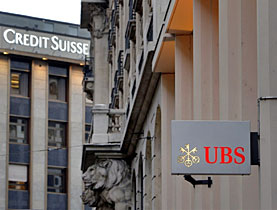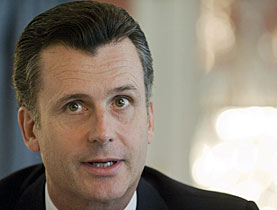Big banks warned they should downsize

An alliance of unlikely partners is calling for regulations to curb the influence of big banks UBS and Credit Suisse on Switzerland's national economy.
It was a strange sight in Bern on Friday to see former cabinet minister Christoph Blocher of the rightwing Swiss People’s Party and Christian Levrat, president of the centre-left Social Democratic Party, sitting on a panel together and actually agreeing.
In between them was Nicolas G. Hayek, chairman of the Swatch Group, who was not alone in warning of the dangers of the huge national influence of Switzerland’s two banking giants.
The alliance came after the Swiss government had to bail out UBS, which incurred massive losses in the United States subprime mortgage crisis and was forced to pay millions to settle charges of rich Americans allegedly involved in tax evasion.
“The problem is that [the banks] are so big, had so much money and were speculating with money… and didn’t manage it the way that it should have been so that they went practically broke,” Hayek told swissinfo.ch.
“If they had gone broke, it would have affected the whole of Switzerland, meaning that my company and many others would have lost lots of money. It would have broken our pension schemes, our salaries.”
“Unique” risk
The alliance pointed out that on the eve of the global financial crisis, the balance sheets of UBS and Credit Suisse were seven times as big as Switzerland’s gross domestic product, a risk that was “unique”.
It added that Iceland was a perfect example of how things could go wrong for the economy.
The message was that the Swiss National Bank (SNB) had learnt the lessons from what had happened and its ideas to correct the situation should be followed.
Philipp Hildebrand, who takes over as president of the SNB in January, had warned in June that the losses of the two Swiss big banks amounted to SFr38 billion ($36.6 billion) in 2008 and risks were still “material”.
He added it was “essential that the big banks take all the necessary measures to ensure their resilience to any further significant deterioration in conditions”.
Reduction of risks
These included a further reduction in their risk positions and strengthening of their capital base.
The alliance warned that a situation in which the state was forced to intervene because of national interests, as in the case of UBS, should not happen again.
There was more than one mention among the panel of the phrase “too big to fail”, implying that the country had no choice other than to step in with money.
It argued the Swiss Financial Supervisory Authority (Finma) should now have more say in controlling the two big banks.
Ever forthright in his opinions, Hayek said the message to the two Swiss banks was clear.
Swiss example
“It’s not just for the two big banks but for the world and for Switzerland. The Swiss are honest people and they want to control what the financial economy is doing and they’re going to give an example to the whole world,” he said.
“We want to show the world that we are better than Wall Street, which is blocking President Obama. The G20 people should know that Switzerland is making reforms.”
Economics professor Kurt Schildknecht insists that the Swiss banks didn’t intend to make mistakes in the past.
“We know everyone makes mistakes in life. What we can change is the size of the bank – if a bank then makes a mistake, it’s not a problem for the whole economy,” he told swissinfo.ch.
There are a plethora of open questions, for example the reactions of UBS and Credit Suisse. How will the government and parliament react to this initiative, as well as the two big banks? The debate is certainly set to continue.
Robert Brookes, swissinfo.ch
UBS in August reported a second-quarter net loss attributable to shareholders of SFr1.42 billion ($1.37 billion).
Net new money outflows were SFr16.5 billion for Wealth Management & Swiss Bank; Wealth Management Americas reported net new money outflows of SFr5.8 billion; net new money outflows totalled SFr17.1 billion for Global Asset Management.
The number of staff was down by 4,400 to 71,806 at the end of June. This will be reduced to about 67,500 by 2010.
Credit Suisse Group reported net income of CHF 1.57 billion in the second quarter of 2009.
There were net new assets of SFr10.7 billion in Private Banking with inflows across all regions.
Employees: 46,700.

In compliance with the JTI standards
More: SWI swissinfo.ch certified by the Journalism Trust Initiative



You can find an overview of ongoing debates with our journalists here. Please join us!
If you want to start a conversation about a topic raised in this article or want to report factual errors, email us at english@swissinfo.ch.